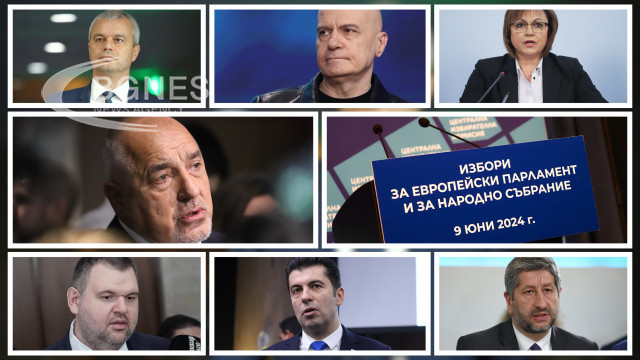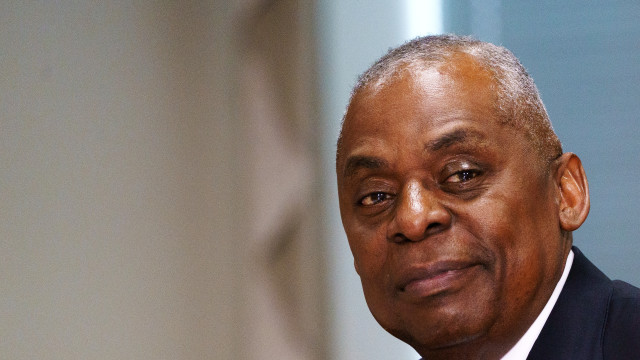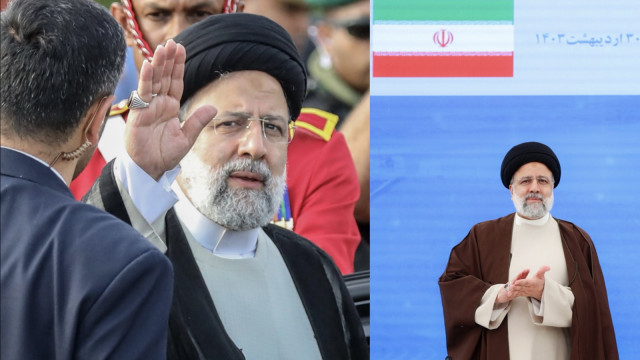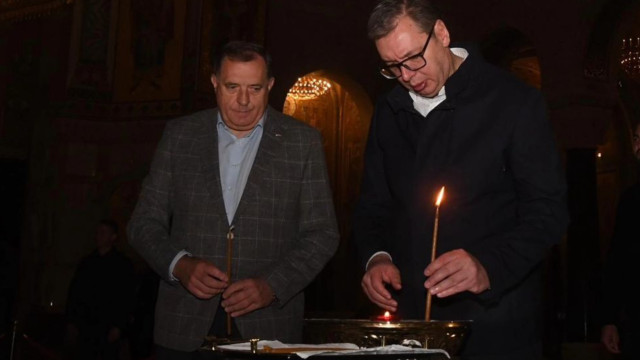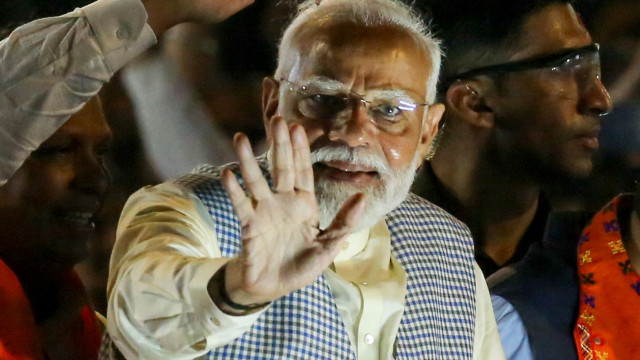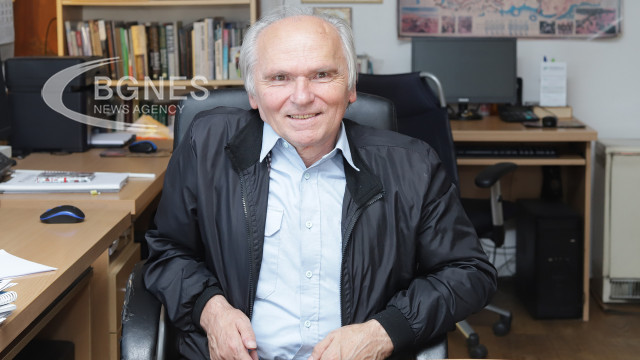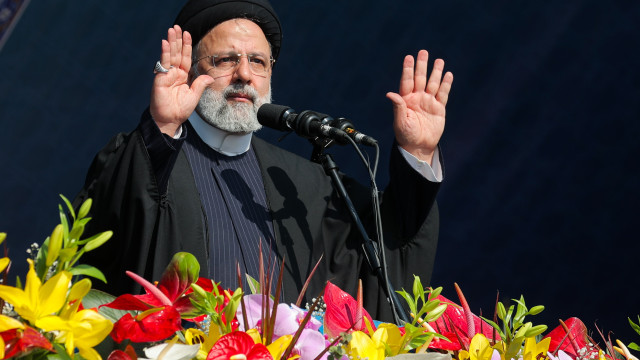45.8% voter turnout for the national and 43.9% - for the European Parliament, is the forecast of "Market Links" on the day the election campaign officially started.
The 2 in 1 election on June 9 is one month away. Dobromir Zhivkov presented on bTV the national survey conducted among 1007 persons before the start of the campaign.
There is little shift in electoral attitudes.
The GERB-Union of Democratic Forces (GERB-UDF) coalition is first, enjoying the support of 26% of the voters of the parliamentary vote and 26.4% for the European elections.
The We Continue the Change-Democratic Bulgaria coalition (WCC-DB) is second with 17.7% in the elections for people's representatives and with 18.6% for Members of the European Parliament (MEPs).
Movement for Rights and Freedoms (MRF) is the third political force – 13.2% support in the parliamentary elections and 11.7% in the Euro vote.
"Vazrazhdane" political party would receive 12.9% in the elections for the National Assembly and 11.1% in the elections for members of the European Parliament.
The Bulgarian Socialist Party (BSP) is in fifth place with 8.1% in the parliamentary elections and 8.4% in the European elections.
"The picture of electoral attitudes has been relatively constant in recent months," sociologist Dobromir Zhivkov specified.
"The trends and dynamics of electoral attitudes are not too great. We see a difference between the vote for the national parliament and the European Parliament among those parties that are more committed to Bulgaria's European path. They will presumably succeed in mobilizing more of their sympathizers. With "Vazrazhdane", the mobilization for the euro vote will be lower. This is seen as a trend," added the sociologist.
According to him, the WCC-DB failed to achieve their stated goals, entering politics and governance, which led to a drop in their electoral support and a difference of 9% with GERB-UDF.
“This great promise of the great change leads to this. When what is promised cannot be delivered, there is churn. The second thing is the "loose fit". It was perceived as unprincipled by a large number of sympathizers. This was skillfully used by GERB. Their goal was to weaken the wave that supported the WCC-DB. Another is the disunity among GERB voters. There have been many dependencies and networks that have operated over the years. GERB sympathizers prefer the status quo. There are also voters who express authentic support for the values of GERB and for the leader Boyko Borisov," he pointed out.
"GERB remains at the same level. No growth. There are movements that do not greatly change the picture. Rather, "We continue the change" lose. They lose from those who have not decided who to vote for, they also lose from the periphery - whether to "Solidary Bulgaria" or "Blue Bulgaria", comments Zhivkov.
"With MRF, it is difficult to estimate how much they will increase their support. Their sympathizers are constant. They increase their weight because the other votes are redistributed. We see a five-party parliament. For the moment, it can be seen that "There is such a people" is not successfully mobilizing to be part of the next parliament," said the sociologist.
According to the survey, "There is such a people" political party (ITN) remain below the line of the parliamentary vote with 3.2%. Slavi Trifonov's party has 2.4% support for the Euro vote.
The newly created coalition "Solidary Bulgaria" of Maya Manolova and Vanya Grigorova received 1.8% in the elections for the National Assembly and 2.3% in the European elections.
The "Blue Bulgaria" coalition will have 1.4% in the parliamentary elections and 1.5% in the European elections.
8.7% indicated they had not decided who they would vote for in the parliamentary vote, and 10.1% were hesitant about the Euro vote.
Over 3% would mark "I do not support anyone" in both elections.
"Solidary Bulgaria" and "Blue Bulgaria" entered the pre-election battle late. They turned up late. Even if they had declared themselves earlier, the political situation is full of tension and scandals," he commented.
According to Dobromir Zhivkov, these data may change during the campaign.
Allocation of mandates in the National Assembly
The GERB-UDF coalition will get more Members of Parliament (MP) into the 50th National Assembly, the data shows. It will have 80 MPs, compared to 69 in the 49th National Assembly.
With the WCC-DB there is a decrease - from 64 people's representatives to 55 in the future parliament.
For the MRF, growth is expected - from 36 to 41 mandates.
"Vazrazhdane" will get two more MPs into the 50th Parliament - 39.
The BSP will also see an increase - from 23 representatives in the 49th National Assembly to 25 in the 50th.
"The math is simpler - 80 plus 41 makes 121. GERB and MRF can form the next government. They have the potential for that. We'll see if that comes to fruition on election day. GERB and DPS are close to a majority, but it remains to be seen whether they will decide to form an independent cabinet. The expectation is to look for a broad coalition formula", commented Dobromir Zhivkov.
"I am convinced that this would cause serious reactions in society, but the possibility of a two-party cabinet is not excluded," the sociologist pointed out.
According to the survey, GERB-UDF will again have six MEPs.
WCC-DB will score four, "Vazrazhdane" - three, MRF- two, and BSP will have the same number.
Voter turnout
"Although we had a series of elections and observed a negative trend for the mobilization of Bulgarian citizens, we can expect at least around the turnout we had in April last year. This is not a great achievement, but at least we can stop the negative trend", pointed out Dobromir Zhivkov.
According to the survey, 45.8% of respondents answered that they would vote in the elections for national representatives, and 43.9% answered that they would vote for members of the European Parliament.
At the last European Elections in 2019, the turnout was 32%.
"People in a polling situation say they're going to vote, but that doesn't always happen in practice. The positive thing is that the Bulgarian MEPs in the next European Parliament will have a higher degree of legitimacy because of the higher activity by about 8%", said Dobromir Zhivkov.
Regarding priorities in foreign policy and the economy, 68% indicate that they agree that our acceptance as a full member of Schengen is important for our country - both for the economy and for tourism.
“There is consolidation. Years ago, it was given the impression that it was not important and there were low scores for Schengen. It was not explained then what the benefits were. Now things are changing a lot," said Dobromir Zhivkov.
Regarding the euro, there is scepticism - 47% do not agree that changing the currency will boost the Bulgarian economy and raise the standard of living.
39% support the adoption of the euro, and 14% are neutral. /BGNES
The results are from the national survey, financed and implemented jointly by bTV and "Market Links", conducted among 1007 persons over 18 years of age in the country in the period April 27 - May 9, 2024, using the methods of direct personal interview and online survey. /BGNES

